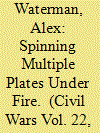|
|
|
Sort Order |
|
|
|
Items / Page
|
|
|
|
|
|
|
| Srl | Item |
| 1 |
ID:
179926


|
|
|
|
|
| Summary/Abstract |
Reintegrating ex-combatants back into society is central to peace building, yet remains poorly understood. This is largely due to the difficulties of conceptualising and measuring reintegration. This paper argues that comparing ex-combatants and civilians can contribute to improved measures of reintegration, and to a better understanding of what it means in a given context. A novel theoretical and methodological approach is proposed, drawing on social cohesion research and creating a composite indicator of reintegration, allowing for comparisons between ex-combatants and civilians, and providing insights about how they differ and why. The approach is demonstrated using surveys from Colombia.
|
|
|
|
|
|
|
|
|
|
|
|
|
|
|
|
| 2 |
ID:
179928


|
|
|
|
|
| Summary/Abstract |
In counterinsurgency, U.S. officials often feel trapped by a localally who appears unable to survive the departure of U.S. forces. Advocates for withdrawal argue that only a deadline to depart will induce local governments to accept greater burdens, while critics of this position argue that plans to withdraw embolden insurgents. We argue instead that American leaders gain leverage from U.S. public opinion favouring withdrawal. Analysis of 200+ U.S. demands of local allied governments in Vietnam and Iraq suggests that public pressure for withdrawal is associated with greater local compliance, but that formal U.S. withdrawal plans does not motivate compliance.
|
|
|
|
|
|
|
|
|
|
|
|
|
|
|
|
| 3 |
ID:
179925


|
|
|
|
|
| Summary/Abstract |
This article discusses benefits and challenges of qualitative-interpretive research conducted in teams of outside (Northern) researchers and national (Southern) associates, in which the latter have considerable autonomy over research design and data generation. Reflecting on our collaboration with Burmese associates on arts-based workshops with violence-affected communities in Myanmar, we discuss how structures and dynamics of power and trust-building shaped the research process and data interpretation. Our reflective analysis suggests that interpretivist research ‘by proxy’ is possible and can be highly enriching but depends upon sufficient time (and funding) for meaningful, long-term engagement with ‘local’ research collaborators, which our project lacked.
|
|
|
|
|
|
|
|
|
|
|
|
|
|
|
|
| 4 |
ID:
179929


|
|
|
|
|
| Summary/Abstract |
The ‘Sahelistan’ discourse that conflates conflict dynamics in Afghanistan and Mali is widespread in Western media and policy circles. We argue that such representations contribute to the adoption of one-size-fits-all conflict management policies. Drawing on extensive fieldwork in both places, we also argue that these standard templates of intervention shape responses from local non-state armed actors, who manipulate foreign interveners for their own (violent) purposes in similar ways. Yet, we show that this convergence in armed group behaviour still manifests itself in important variations in widely different contexts, furthering strongmen autonomy in Afghanistan, while fostering armed group fragmentation in Mali.
|
|
|
|
|
|
|
|
|
|
|
|
|
|
|
|
| 5 |
ID:
179930


|
|
|
|
|
| Summary/Abstract |
Order informs an actor’s context, studying order and accounting for the rules and relationships underpinning that order can tell us a great deal about how power and authority is constructed, renegotiated and contested. Order represents a promising prism and field of study for understanding civil wars. This article begins by assessing the ‘order turn’ in the literature over the past decade. From this basis we identify four key areas that represent important elements within the new ordering agenda that promise to add significantly to the study of order within the discipline. These include: 1) Mapping order(s) to better account for their complexity, especially by disaggregating internal orders within institutions and organisations; 2) Recognising civilians as individual and collective agents, moving beyond the civilians-as-victims paradigm to demonstrate how civilian action shapes order, forcing both rebel groups and governments to adapt; 3) Exploring the social mechanisms that reinforce order, thus moving the discussion beyond violence and political orders and towards a more holistic perspective; 4) Understanding that all orders are mutually constituted and thus understanding not only how order is expressed or acted upon but also how order is understood, how assumptions about order influence action, and crucially, how each group’s actions are shaped by the generation of knowledge about the order they inhabit. Using these we highlight both the promise of the concept of order for the study of civil wars and attempt to begin the development of a coherent research agenda to unify existing insights and lay the foundations for further advances.
|
|
|
|
|
|
|
|
|
|
|
|
|
|
|
|
| 6 |
ID:
179927


|
|
|
|
|
| Summary/Abstract |
The phenomenon of governance by insurgents characterises many contexts of civil war and influences political, security, social, and economic dynamics in the original conflict zone and beyond. Therefore, understanding how different insurgents govern seems of crucial importance. However, in the existing literature no typology has been advanced that captures the multiple dimensions of rebel governance and allows to develop detailed and comparable assessments of the different patterns of rule implemented by different rebels. Considering this gap a limit to the study of insurgent governance, the present paper aims to propose a multi-dimensional typology for investigating how rebels govern.
|
|
|
|
|
|
|
|
|
|
|
|
|
|
|
|
|
|
|
|
|